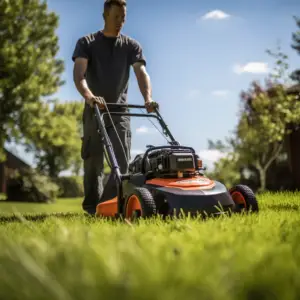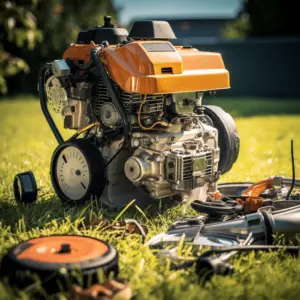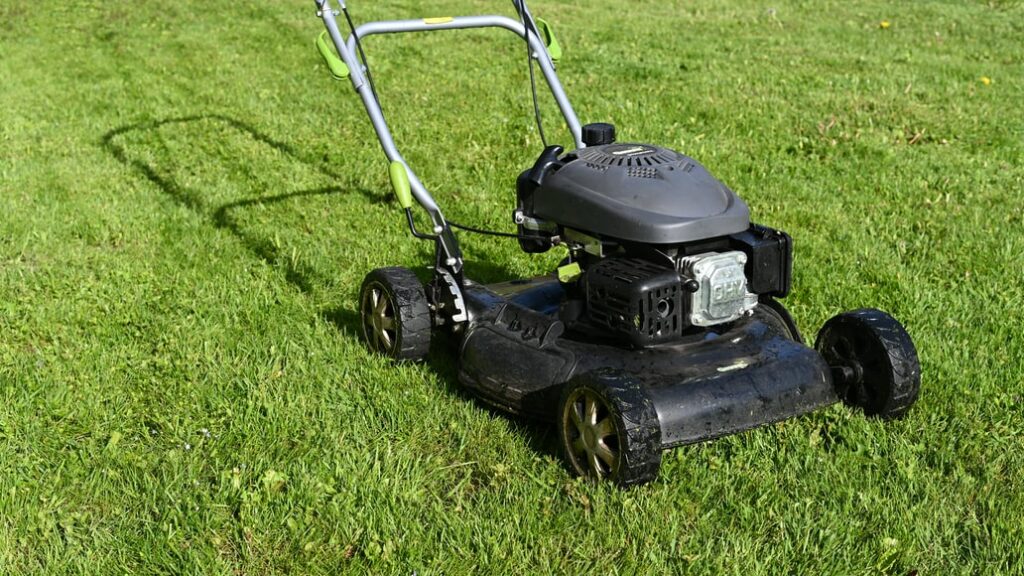When trimming the yard, washing the deck, or cutting firewood, you need a piece of home equipment that works at its best from the start to the end. When there is a sudden loss of power, it’s difficult for you to continue with the task.
Power loss can be a continuous thing or an ebb and flow, but the outcome of the two variations are the same. While on duty, you definitely don’t like interruptions that chip in a while at work.
Unfortunately, you will probably experience it a little bit if you’re operating with the lawnmower that loses power while under load.
It’s normal for a lawn mower to run slowly and rough if it’s old. However, you would expect a relatively smooth use with new ones. According to experts, consistent lawn mower output is anticipated throughout its life.
Unfortunately, they tend to lose power from time to time; it might shut down completely, leading to temporary and even permanent losses.
Table of Contents
What Makes The Lawn Mower To Lose Power?

You may have no problems with your lawnmower on flat ground, but when it’s under load you feel like it’s failing you completely. If your lawn mower always loses power when cutting grass on a slope or uphill, it’s a clear indication that it has a problem.
Troubleshooting as a diagnostic criterion is required to determine why the lawnmower is losing power when mowing uphill and when under load. In most cases, the issue is pretty obvious, and all it takes is a few basic tweaks or standard maintenance measures to get it back in proper working condition.
The common reasons that make lawnmowers lose power include the following;
Dirty Blades and the Clogged Air Channels
As you go upward, dirt, debris, and corroded materials can cause your lawnmower to lose power. When the blades are coated with dirt, grass, or any other debris, the oscillations are slowed down, and the engine has to work harder to spin and operate as expected. A clogged air filter might also cause power issues.
The solution of dirty blades and blocked air passage is to clean or replace the mower’s air filter and remove blockages from the blades and below the engine’s blower housing. Before reaching out to any of the mower’s parts, remember to switch it off first.
Carburetor Issues
Gases and air are mixed in a carburetor to make motor fuel. Unclean carburetors may not provide the gasoline vapors needed to power the lawnmower uphill and under heavy loads.
Repairing faulty seals and gaskets in the carburetor may fix the problem. If the technique doesn’t improve uphill and under load performance, have an expert check the choke switch. If it breaks, you must replace or repair it before using the lawnmower again.
Fuel Problems
Insufficient gas and oil are the main causes of lawnmower power loss under load. If the mower’s gas tank is low, mowing uphill may minimize carburetor fuel.
Leaning the mower back releases gas from the carburetor, causing gearbox issues. Reduced engine oil may cause your mower to lose power. You may have dirt or water in the mower engine; drain and replace the tank with new fuel, or have a skilled dealer service it.
Additionally, fill the gasoline tank and crankcase to the optimum levels. Regular fuel tank inspection improves mower performance.
Clogged Muffler
The mower’s muffler is where burnt gas and other fumes are expelled. Debris and fluid blocking the muffler prevent the burnt gas from escaping your lawnmower, causing major issues such as a seized motor.
If your lawnmower has the trend of emitting colored smoke, the muffler is likely blocked. As part of a normal lawn mower maintenance program, clean your lawn mower’s muffler at the start of each season.
Ignition Issues
If the spark plugs in the mower are pitted or clogged, they will not ignite the gasoline vapors when the pistons go higher or under heavy loads. With time and use, spark plugs become covered with carbon, dirt, and oil.
It’s essential to examine, change, or clean the spark plugs every season to minimize the interference associated with ignition and power loss.
What You Need to Do If Your Lawn Mower loses Power under Load?

If you’ve a lawn mower machine that is constantly losing power, check the pistons as well as the air filters.
Furthermore, the repair and symptom guides provided in this article will help you determine the specific mower component causing the problem. For more precise repair and maintenance instructions, consult the handbook for your model.
The guidelines given below will help you keep the lawn mower under load work without power loss;
- The air filter cleans the air entering the lawnmower, keeping the engine running smoothly. Dirt and debris would clog the carburetor’s tiny fuel openings, causing damage to the piston and the cylinder wall. Check and replace the air filter regularly. Debris will accumulate on the air filter, preventing the necessary amount of air from passing through. When such happens, the engine loses power. Maintenance of your lawnmower’s air filter is simple and should be done regularly. Each mowing season, inspect the filter and replace it when it has revolted.
- The piston and cylinder generate power. After combustion, the piston pushes the crankshaft. The crankshaft drives the mower’s blade and drives wheels. The explosion creates compression in the cylinder. The piston rings keep the compression in the cylinder; the rings secure the piston to the cylinder walls. A few molecules of oil keep the rings from rubbing against the cylinder. Compression is lost as the rounds wear or the cylinder is damaged. Have trouble starting your lawn mower or it loses power under load? Hire an expert check and correct piston and cylinder configurations.


